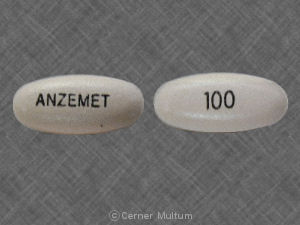What is Anzemet (Dolasetron)?
 Dolasetron blocks the actions of chemicals in the body that can trigger nausea and vomiting.
Dolasetron blocks the actions of chemicals in the body that can trigger nausea and vomiting.
Dolasetron is used to prevent nausea and vomiting that may be caused by surgery or by medicine to treat cancer (chemotherapy).
Dolasetron may be used for other purposes not listed in this medication guide.
What is the most important information I should know about Anzemet (Dolasetron)?
You should not use this medication if you are allergic to dolasetron or to similar medicines such as ondansetron (Zofran), granisetron (Kytril), or palonosetron (Aloxi).
Before taking dolasetron, tell your doctor if you have a heart rhythm disorder; a personal or family history of Long QT syndrome, or an electrolyte imbalance (such as low levels of potassium or magnesium in your blood).
Dolasetron is usually taken 1 hour before chemotherapy or 2 hours before surgery. Tell your doctor if you forget to take the medication within the specified amount of time before your procedure.
What should I discuss with my healthcare provider before taking Anzemet (Dolasetron)?
You should not use this medication if you are allergic to dolasetron, to similar medicines such as ondansetron (Zofran), granisetron (Kytril), or palonosetron (Aloxi).
If you have any of these other conditions, you may need a dose adjustment or special tests to safely take dolasetron:
- a heart rhythm disorder
- a personal or family history of Long QT syndrome; or
- an electrolyte imbalance (such as low levels of potassium or magnesium in your blood)
FDA pregnancy category B. This medication is not expected to be harmful to an unborn baby. Tell your doctor if you are pregnant or plan to become pregnant during treatment.
It is not known whether dolasetron passes into breast milk or if it could harm a nursing baby. Do not use this medication without telling your doctor if you are breast-feeding a baby.
Dolasetron orally disintegrating tablets may contain phenylalanine. Tell your doctor if you have phenylketonuria (PKU).
Anzemet Side Effects
What are the possible side effects of Anzemet (Dolasetron)?
Get emergency medical help if you have any of these signs of an allergic reaction: hives; difficulty breathing; swelling of your face, lips, tongue, or throat.
Call your doctor at once if you have a serious side effect such as:
- fast or pounding heartbeats
- feeling like you might pass out
- slow heart rate, weak pulse, fainting, slow breathing; or
- chest pain or heavy feeling, pain spreading to the arm or shoulder, nausea, sweating, general ill feeling
Less serious side effects may include:
- headache
- tired feeling
- diarrhea or constipation
- chills, shivering
- dizziness
- fever, sweating; or
- rash
This is not a complete list of side effects and others may occur. Call your doctor for medical advice about side effects. You may report side effects to FDA at 1-800-FDA-1088.
Anzemet Interactions
What other drugs affect Anzemet (Dolasetron)?
Tell your doctor if you use other medications that can affect heart rate, especially:
- arsenic trioxide (Trisenox)
- droperidol (Inapsine)
- a diuretic (water pill)
- an antibiotic such as clarithromycin (Biaxin), erythromycin (E.E.S., EryPed, Ery-Tab, Erythrocin), levofloxacin (Levaquin), moxifloxacin (Avelox), or pentamidine (NebuPent, Pentam)
- an antidepressant such as amitriptylline (Elavil, Vanatrip), clomipramine (Anafranil), or desipramine (Norpramin)
- anti-malaria medications such as chloroquine (Arelan), or mefloquine (Lariam)
- heart rhythm medicine such as amiodarone (Cordarone, Pacerone), dofetilide (Tikosyn), disopyramide (Norpace), ibutilide (Corvert), procainamide (Pronestyl), propafenone (Rythmol), quinidine (Quin-G), or sotalol (Betapace)
- other medicine to prevent or treat nausea and vomiting, such as ondansetron (Zofran), granisetron (Kytril), or palonosetron (Aloxi)
- medicines to treat psychiatric disorders, such as chlorpromazine (Thorazine), clozapine (FazaClo, Clozaril), haloperidol (Haldol), pimozide (Orap), thioridazine (Mellaril), or ziprasidone (Geodon)
- migraine headache medicine such as sumatriptan (Imitrex) or zolmitriptan (Zomig); or
- narcotic medication such as levomethadyl (Orlaam), or methadone (Dolophine, Methadose)
This list is not complete and there may be other drugs that can interact with dolasetron. Tell your doctor about all your prescription and over-the-counter medications, vitamins, minerals, herbal products, and drugs prescribed by other doctors. Do not start a new medication without telling your doctor.
What should I avoid while taking Anzemet (Dolasetron)?
Follow your doctor’s instructions about any restrictions on food, beverages, or activity.
Anzemet Dosage
How should I take Anzemet (Dolasetron)?
Take this medication exactly as it was prescribed for you. Do not take the medication in larger amounts, or take it for longer than recommended by your doctor. Follow the directions on your prescription label.
Dolasetron is usually taken 1 hour before chemotherapy or 2 hours before surgery. Follow your doctor’s instructions.
Store dolasetron at room temperature away from moisture and heat.
What happens if I overdose on Anzemet (Dolasetron)?
Seek emergency medical attention if you think you have received too much of this medicine.
Overdose symptoms may include feeling light-headed, or fainting.
What happens if I miss a dose of Anzemet (Dolasetron)?
Tell your doctor if you forget to take your dose within 1 hour before chemotherapy or 2 hours before surgery. Do not take extra medicine to make up the missed dose.
Edited from everydayhealth.com
